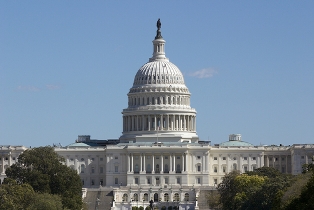New START Slowed by Partisan Politics
September 30, 2010
Featured Image
Today's top nuclear policy stories, with excerpts in bullet form.
Stories we're following today: Thursday, September 30, 2010.
Conservatives Blocking Reagan’s Security Strategy – Joe Cirincione in The Huffington Post
- October 1st marks 18 years since the U.S. Senate approved President Ronald Reagan's Strategic Arms Reduction Treaty, or START. It also marks the 300th day since that treaty expired, cutting off U.S. weapons inspectors' access to Russian nuclear sites. Conservatives in the Senate are now blocking the restart of Reagan's inspections.
- New START is not a radical shift in U.S. security policy. The new treaty places the same inspectors back into Russia to continue the vital work that Reagan tasked them with years ago. It cuts deployed long-range forces by 30 percent, as did Reagan's treaty, but still leaves both nations with more than enough weapons for any conceivable military contingency.
- Ratification of New START nonetheless remains uncertain, as the Senate has tabled the vote before the impending midterm elections.
- Senator Jim DeMint (R-SC) is leading the charge to kill the treaty, while Senator Jon Kyl (R-AZ) is delaying any vote until he can get more money for his favored weapons programs.
- We need Reagan's inspectors back on the job. We need to have New START placed at the top of the agenda for the Senate to approve when it reconvenes after the November election. The Senate should respect Reagan's legacy and pass this vital national security treaty.
Not All Continues in Continuing Resolution - David M. Herszenhorn for The Caucus a New York Times Blog [link]
- The most important piece of business that lawmakers must accomplish before they leave Washington to campaign full-time in the November elections is a temporary spending measure that will finance the federal government through early December.
- The measure includes a $624 million increase for the National Nuclear Security Administrations weapons programs, bringing the total annual appropriation to $7 billion – in an effort to modernize the nation’s nuclear arsenal, which some senators, including Jon Kyl, Republican of Arizona, say is crucially needed before they agree to ratify a new START treaty.
Russia Bans Iranian Investments in Nuclear Industry – Fang Yang for Xinhuanet.com [link]
- Russia has prohibited Iranian investments in any commercial activities involving uranium production or use of nuclear material and technology, the Interfax news agency reported on Thursday.
- The decree was issued by Russian President Dmitry Medvedev last Wednesday to comply with the U.N. Security Council resolution No. 1929.
- "Any investment by Iran, its citizens and legal entities registered in Iran or located in its jurisdiction, or individuals or legal entities acting on their behalf or on their orders, or organizations owned or controlled by them, in any commercial activity related to uranium production, or production or use of nuclear material, equipment, special non-nuclear materials and relevant technologies subject to export control, will be prohibited in Russia," the presidential decree said.
- Earlier this week, Russia scrapped plans to deliver S-300 air defense missile systems to Iran as they fall under the U.N. sanctions.
- Iranian officials responded that the country would sue Russia if Moscow fails to deliver the system to Iran.
Alexander Wants to Upgrade 'Substandard' Nuke Facilities – Frank Munger in The Knoxville News Sentinel [link]
- U.S. Senator Lamar Alexander…said Wednesday that he hadn't decided whether to vote for ratification of the New START Treaty.
- "I haven't made a decision yet on how to vote on the New START Treaty, but I'm open to the idea of responsibly continuing to reduce our nuclear weapons - a process begun by President (Ronald) Reagan - as long as we modernize our nuclear facilities," Alexander said.
- Alexander said he and other senators who have been to Y-12 or visited similar facilities in Texas and New Mexico have witnessed workers handling nuclear weapons in "substandard" conditions.
North Korea Vows to Strengthen Nuclear Arms – Ali Akbar Dareini for the Associated Press
- North Korea vowed Wednesday to strengthen its nuclear weapons stockpile in order to deter a U.S. and South Korean military buildup in the region.
- Speaking before the United Nations Wednesday, North Korea's Vice-Minister of Foreign Affairs Pak Kil Yon said Pyongyang is, however, ready to join nuclear nonproliferation efforts in its capacity as a nuclear weapon state.
- The U.S. is trying to restart stalled negotiations on North Korea's nuclear disarmament. North Korea walked out of the six-party talks last year amid international criticism of its long-range rocket launch.
- Pak didn't say if his country was ready to return to talks but said a nuclear-weapon-free Korean peninsula would be achieved only if external nuclear threats are eliminated, a referrence to the U.S. presence in South Korea.
Iran's European Helpers – Mark Dubowitz and Benjamin Weinthal in The Wall Street Journal [link]
- The European Union in July imposed unprecedented sanctions against Iran's energy and financial sectors. [Still], some European companies continue to sign up for business deals in Iran that may be both directly and indirectly supporting Iran's nuclear development.
- The U.S. State Department and U.S. Congress are currently investigating a number of foreign companies to determine if they are in violation of U.S. sanctions against Iran. While the list of the companies being scrutinized has not been made public, U.S officials have told us that they are concerned that [a Swiss firm’s] 25-year, multi-billion euro supply agreement could violate EU and U.S. sanctions prohibiting the transfer of technology and technical expertise to Iran.
- The German Engineering Federation (VDMA) has long lobbied against the sort of sanctions that now prohibit European companies from investing in Iran's energy projects and providing technology or technical assistance.
- [No] company has been sanctioned by the U.S. Senior Obama Administration officials have told us that they are "very, very close" to a decision on which firms will face penalties under U.S. law.



